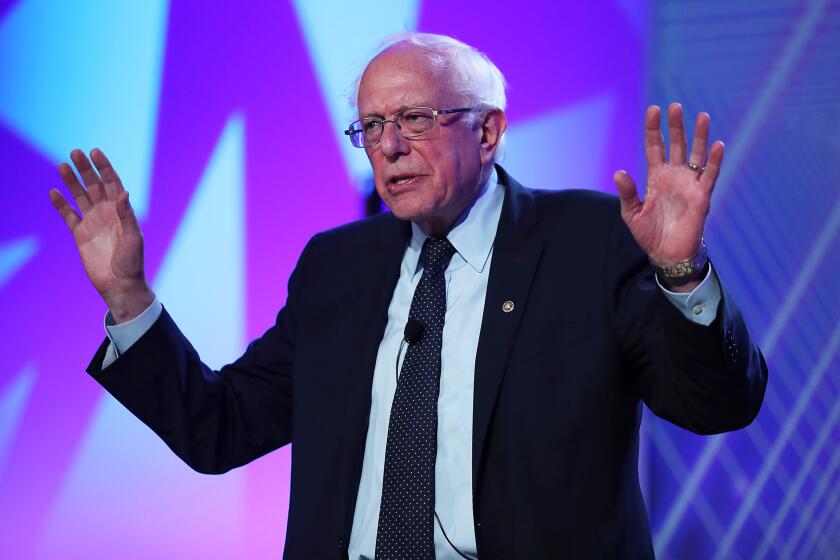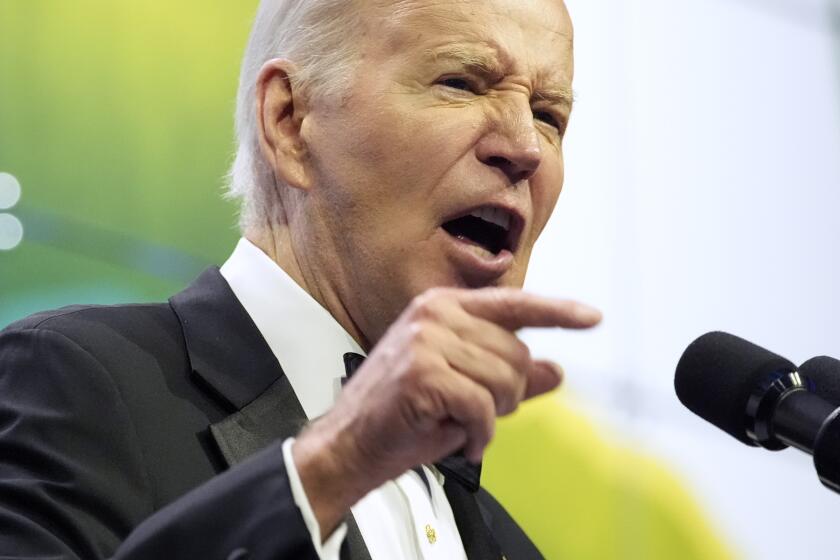Democrats Look to Public Mood to Stall Impeachment Push
Buoyed by initial reaction supporting President Clinton, the White House and congressional Democrats expressed hope Tuesday that the public’s dispassionate response to the president’s videotaped grand jury testimony will help stall any impeachment drive on Capitol Hill.
Opinion polls showed that the president’s job approval rating rose six points after his four hours of testimony was broadcast Monday, and his defenders now believe that this kind of support could throw cold water on Republican attempts to remove Clinton from office.
Even several GOP members of the House Judiciary Committee conceded that the edge may have shifted to the Democrats, noting that constituents in their districts were not angered by Clinton’s taped defense of himself in the Monica S. Lewinsky sex-and-perjury scandal.
One of them, Rep. Asa Hutchinson (R-Ark.), suggested that the panel should be mindful of public opinion before it releases all of the supporting material independent counsel Kenneth W. Starr sent to the House.
“The Judiciary Committee needs to always consider public opinion,” Hutchinson said. “There’s a possibility of backlash against anyone who is not handling this fairly.”
Clinton’s lawyers took advantage of his unexpectedly good showing by taking the offensive for the first time in weeks, saying in a letter to Judiciary Committee members that Starr had left out of his report information that would bolster the president’s defense.
It was unclear, however, whether new concern among Republicans for public opinion would change what looked like a Republican juggernaut rolling toward impeachment hearings last week.
To be sure, Republican leaders on Capitol Hill remained determined to continue reviewing and releasing more documents from the impeachment files sent to them by Starr. The rest of the material--which includes testimony by former Lewinsky friend Linda Tripp, Clinton secretary Betty Currie and presidential friend Vernon E. Jordan Jr.--is set to be made public no later than Monday.
“We’re doing our job,” said Judiciary Committee Chairman Henry J. Hyde (R-Ill.). “We’re following our mandate.”
Hyde said he expects a recommendation from his panel soon and a full House vote by early October on whether to move to the next step--a formal impeachment inquiry by his committee.
He also signaled that he would like to begin preliminary committee hearings on the controversy after the Nov. 3 elections but before the current 105th Congress expires at the end of the year.
Despite the expectation that release of the videotape would damage Clinton’s standing in public opinion polls, it seemed to help him. Instead of Republican leaders marshaling more momentum toward a vote on impeachment, the public’s approval of Clinton’s performance as president not only continued to hold strong, but actually was improving.
A Gallup Poll conducted Tuesday for CNN and USA Today showed that 66% of respondents approved of the job Clinton is doing, six points higher than the figure Sunday, the day before the videotape was broadcast.
Clinton Meets With Japan Leader
Clinton, in New York attending a meeting on the global economy with the Japanese prime minister, declined to discuss the uneasy balance between the public’s approval of his work as president and House Republicans’ desire to push for impeachment.
“I don’t have anything to add to whatever the White House is saying about all this,” he said during a brief press appearance at a New York hotel.
“Believe it or not, I haven’t read the reports,” he added. “I think it’s important that I focus on what I’m doing for the American people.”
Behind the scenes, his staff and legal team were maneuvering to bolster Clinton’s position. Their main complaint Tuesday came in the form of the letter from Clinton’s private attorney and the White House counsel’s office, charging that Starr had excluded from his 445-page report evidence helpful to Clinton.
In a letter to Hyde, they complained that Lewinsky’s testimony that “no one ever asked me to lie and I was never promised a job for my silence” was left out of Starr’s report.
Although that statement does appear in Lewinsky’s testimony made public Monday, White House Counsel Charles F.C. Ruff and David E. Kendall, the president’s personal attorney, said that not including it in the report to the House “raises grave questions about the fundamental fairness of the Starr referral.”
Their letter added: “The referral is stunning in its silence about evidence that supports the president.”
Jim Kennedy, spokesman for the White House counsel’s office, said of Lewinsky’s statement: “It is one sentence but it is also the crux of the whole investigation.”
A letter in response from Starr’s office noted two references in his report to the content of that sentence. Both references were paraphrases of Lewinsky’s words and both interjected the word “explicit” or “explicitly” to modify her statement.
“Ms. Lewinsky has stated that the president never explicitly told her to lie,” said one reference.
Kennedy said that Watergate prosecutor Leon Jaworski had set an example for fairness that Starr has not achieved and he urged Congress not to make the same mistake by falling short of the example set by that earlier Congress.
“Jaworski didn’t draw his own conclusions; he didn’t spin. We’re seeing spin in this report from someone who at one point said he wasn’t interested in spin--just the facts. Ultimately we got just the sex,” Kennedy said.
Hyde acknowledged receiving the letter from Clinton’s lawyers but did not agree that information was purposely excluded to be unfair to the president. He also shooed away Democratic complaints that his committee is not acting in a bipartisan spirit, as originally promised.
“I think their strategy is to look for arguments,” Hyde said. “My strategy is to smile.”
Idea Floated for Panel Appearance
On another front, Clinton supporters floated the idea of having the president appear before the Hyde committee to defend his position. The idea met with cautious reviews from both sides of the aisle.
Senate Majority Leader Trent Lott (R-Miss.) said that an appearance by the president would be “probably a positive development.”
His counterpart, Senate Minority Leader Tom Daschle (D-S.D.), was not so sure. “That’s something the president’s going to have to decide,” Daschle said. “Only he can make that decision.”
But Daschle added that Clinton should not appear in what he called the current strident atmosphere among Republican House members.
“If the House Republicans, especially on the Judiciary Committee, cannot be more fair than they’ve been thus far, I’d have real questions about what kind of a fair hearing the president would get,” he said.
Public opinion is clearly driving what happens next in the congressional investigation. That can be seen in the offices of the two Democratic senators from California.
Sen. Barbara Boxer, locked in a tight reelection campaign with GOP State Treasurer Matt Fong, said that for the first time in weeks Senate Democrats did not talk about the scandal during their Tuesday luncheon. Instead, they discussed Social Security, regulation of managed health care and raising the minimum wage.
She suggested that Democrats were responding to a public call for politicians to put the scandal behind them.
But a spokesman for Sen. Dianne Feinstein said that her office received 19,000 scandal-related calls from constituents--an extraordinarily high amount for any issue--in the week after the Starr report was released on Sept. 11.
In contrast to the polls, the vast majority of the calls--by a margin of nearly 2 to 1--said that Clinton should be impeached or resign, the spokesman said.
Clinton got a strong endorsement at the White House on Tuesday from South African President Nelson Mandela, who pledged to stand by him because no other American president has identified himself more with the aspirations of black people.
“It is not our business to interfere in this matter,” the 80-year-old leader said. “but we do wish to say that President Clinton is a friend of South Africa and Africa and, I believe, the friend of the great mass of black people and minorities and the disabled of the United States,” said Mandela.
Mandela led a standing ovation in the East Room for Clinton.
Times staff writers Edwin Chen, James Gerstenzang, Janet Hook, Alan C. Miller and Elizabeth Shogren contributed to this story.
The full version of video transcripts of Clinton’s testimony as well as all the supporting documents released by the House Judiciary Committee can be seen on the Times’ Web site. Go to:
https://www.latimes.com
* DEMOCRATIC TEST: Clinton’s crisis is a particular challenge for conservative Democrats in November. A10
More to Read
Get the L.A. Times Politics newsletter
Deeply reported insights into legislation, politics and policy from Sacramento, Washington and beyond. In your inbox three times per week.
You may occasionally receive promotional content from the Los Angeles Times.







